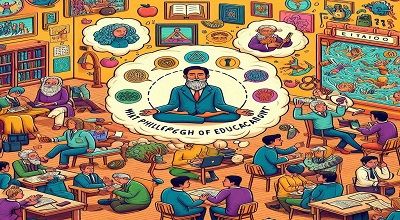Educational Philosophy Definition
Now guys below are 5 major philosophies of education. But first of all definition of Educational philosophy, often referred to as the philosophy of education, is a branch of philosophy. That explores and examines the fundamental questions, principles, and ideas underlying the field of education. It seeks to clarify the nature and purpose of education. The methods and practices of teaching and learning, and the role of educators and learners in the educational process. Educational philosophy addresses various aspects of education, including curriculum design, teaching methods, assessment, and the goals of education.
Explain 5 major philosophies of education
The 5 major philosophies of education are:
- Essentialism: This philosophy focuses on teaching the essential knowledge and skills that students need to become productive and responsible citizens. It emphasizes the core subjects. Such as mathematics, science, history, and language arts. And follows a traditional and structured curriculum. It also aims to instill moral values and discipline in students. Essentialism is the most common approach to education in today’s classrooms.
- Perennialism: This philosophy is based on the idea that some truths and values are universal and timeless. That education should help students discover and appreciate them. It stresses the importance of studying the classics. Such as art, music, literature, and philosophy. And developing rational thinking and logical reasoning. Perennialism views education as a means of cultivating the human mind and spirit.
- Progressivism: This philosophy is inspired by the works of John Dewey. Who advocated for a student-centered and experiential approach to education. It emphasizes the relevance of the curriculum to the student’s needs and interests. And encourages them to learn by doing, exploring, and problem-solving. Progressivism also fosters social skills, creativity, and democratic values in students.
- Social reconstructionism: This philosophy is influenced by the social. And political movements of the 20th century. Such as feminism, civil rights, and environmentalism. It views education as a tool for social change and justice. And challenges students to critically examine the status quo and take action for a better world. Social reconstructionism also promotes multiculturalism, diversity, and global awareness in students.
- Existentialism: This philosophy is derived from the works of existentialist thinkers. Such as Sartre, Camus, and Nietzsche. It emphasizes the individuality, freedom, and responsibility of each student. And encourages them to find their own meaning and purpose in life. Existentialism also respects the diversity of beliefs and values among students. And supports their personal growth and self-expression.
What are some criticisms of these philosophies?
Here are 5 major philosophies of education. There are many possible criticisms of different educational philosophies. But I will mention a few common ones here:
- Essentialism: This philosophy may be criticized for being too rigid, conservative, and authoritarian. It may not account for the diversity, creativity, and individuality of students. It may impose a fixed and standardized curriculum that does not reflect the changing needs and interests of society. It may also neglect the affective, social, and moral aspects of education.
- Perennialism: This philosophy may be criticized for being too elitist, abstract, and irrelevant. It may not prepare students for the practical challenges and opportunities of the modern world. It may ignore the cultural, historical, and contextual factors that shape human knowledge and values. It may also overemphasize rationality and logic at the expense of emotion and intuition.
- Progressivism: This philosophy may be criticized for being too relativist, subjective, and permissive. It may not provide students with clear standards, goals, and expectations. And it may allow them to follow their whims and impulses without proper guidance and discipline. It may also undermine the authority and expertise of teachers. And the quality and rigor of the curriculum.
- Social reconstructionism: This philosophy may be criticized for being too radical, political, and ideological. It may not respect the diversity of opinions and perspectives among students, teachers, and parents. And it may indoctrinate them with a particular agenda or worldview. It may also neglect the academic, and cognitive. Intellectual aspects of education in favor of social activism and advocacy.
- Existentialism: This philosophy may be criticized for being too individualistic, nihilistic, and pessimistic. It may not foster a sense of community, solidarity, and responsibility among students. Teachers, and society. May be encouraged to question or reject any authority or tradition. It may also overlook the positive and meaningful aspects of life and education.
